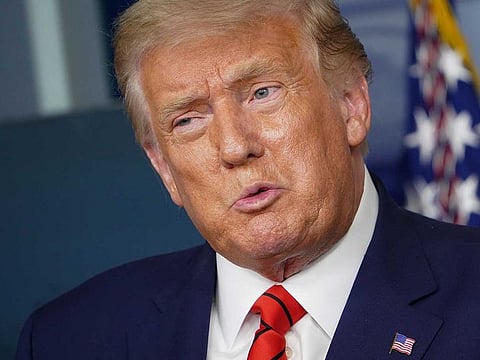Trump to unveil Gaza peace plan to Arab, Muslim leaders, will address UNGA
US president to push post-war Gaza blueprint at closed-door talks with key regional powers

Dubai: United States President Donald Trump is set to reveal his plan for ending Israel’s war on Gaza and charting the territory’s future at a meeting with Arab and Muslim leaders on the sidelines of the United Nations General Assembly (UNGA) on Tuesday.
The high-stakes gathering could be Washington’s most ambitious attempt yet to push for a post-war framework in Gaza, nearly two years into a conflict that has killed more than 65,000 Palestinians.
At a glance
Trump to reveal Gaza peace plan to Arab and Muslim leaders Tuesday
Meeting held on sidelines of UNGA, not in General Assembly session
Proposal includes Israeli withdrawal, Arab/Muslim peacekeeping troops, and regional funding
Hamas excluded; possible limited role for the Palestinian Authority
Indonesia offers peacekeepers; France, UK, Canada, Australia and others recognise Palestinian state
Gaza war has killed more than 65,000 Palestinians, displaced entire population, triggered famine
Hamas letter reportedly offers 60-day truce in exchange for release of half the remaining hostages
Trump’s Gaza plan
According to reports by Israel’s Channel 12 and Axios, Trump will propose a framework for an eventual Israeli military withdrawal from Gaza, backed by an Arab- and Muslim-led security force to maintain order. The plan also envisions governance and reconstruction funded by regional powers, but leaves no role for Hamas.
The White House confirmed that Trump will meet leaders from Saudi Arabia, the UAE, Qatar, Egypt, Jordan, Turkey, Indonesia and Pakistan. Arab sources told Axios the proposal includes some future involvement of the Palestinian Authority (PA), despite Israel’s repeated opposition.
Regional reactions
Indonesian President Prabowo Subianto said his country is ready to contribute peacekeeping forces in Gaza. “We are willing to provide peacekeeping forces,” he declared at a UN conference on the two-state solution hosted by France and Saudi Arabia on Monday, as more nations — including France, the UK, Canada, Australia and Portugal — formally recognised a Palestinian state.
Israel has not drafted the Trump plan but Prime Minister Benjamin Netanyahu has reportedly been briefed on its details. Israel has long rejected any role for the PA in Gaza’s governance.
A war with no end in sight
Israel’s campaign in Gaza, launched after Hamas’s October 2023 attack that killed 1,200 people and saw more than 250 taken hostage, has left the territory in ruins. The war has displaced Gaza’s entire population, triggered famine, and drawn accusations of genocide from rights experts and a UN inquiry.
Efforts to reach a ceasefire have repeatedly collapsed. Earlier this month, negotiations faltered after Israel launched unprecedented strikes on Qatar targeting Hamas leaders, despite claims both sides were close to a deal.
On Monday, Fox News reported that Hamas had drafted a letter offering a 60-day truce in exchange for the release of half the remaining 48 captives, under Trump’s guarantee. The letter is said to be held by Qatar, though neither Hamas nor Doha have commented.
Diplomatic backdrop
Trump’s initiative comes a day after dozens of world leaders at the UN endorsed Palestinian statehood, calling a two-state solution the only path to peace. Israel condemned the move as “a reward to extremism,” while Washington stood firm in its opposition.
Both Trump and Qatar’s Emir Tamim bin Hamad Al Thani are scheduled to address the UNGA on Tuesday, underscoring the diplomatic weight surrounding the Gaza conflict.
Sign up for the Daily Briefing
Get the latest news and updates straight to your inbox



